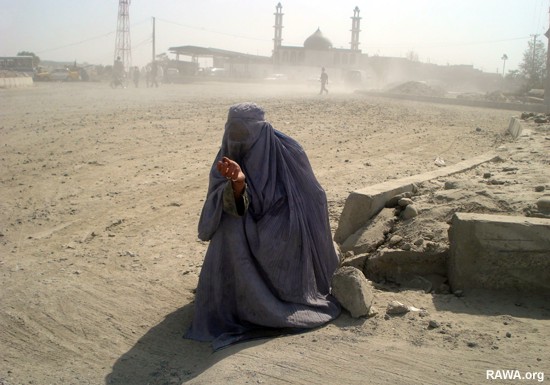ASADABAD - Saliha still mourns the death of her three-year-old daughter, Halima, who died due to severe diarrhoea at a hospital in Kunar Province, eastern Afghanistan, on 11 January.
The child had drunk contaminated water which Saliha's family collects from a nearby river and uses for all purposes, including drinking, cooking and washing.

Feb.6, 2008 - Kabul: An Afghan woman with her child, begs in the bitter cold. (RAWA photo)
About 200 metres away from where households in Spinkay village, Asmar District, collect water, is a mosque built across the river where dozens of men gather for prayer five times a day. Men who come to the mosque often perform their ablutions (washing their hands, arms, face, head and feet) with river water. Some even urinate and/or defecate near the riverbanks, and refresh afterwards with the river water.
It is not always a surprise for locals to see human faeces, sputum and even animal dung floating in the running water. There is a consensus among some residents in Spinkay village, and indeed many other rural communities across Afghanistan, that "flowing water" is always clean, unless the colour, smell and taste is changed.
However, not only was Saliha's daughter killed by the "flowing" river water but many other children also suffer various water-borne diseases, according to medical experts in Asadabad, provincial capital of Kunar Province.
Preventable diseases such as diarrhoea, cholera, dysentery and pneumonia kill about 600 under-five Afghan children every day, according to the UN Children's Fund (UNICEF).
About 25 percent of under-five children in Afghanistan are affected annually by diseases originating from poor and/or bad sanitation.
World's worst toilets
According to the State of the World's Toilets 2007 report, about 92 percent of Afghanistan's estimated 26.6 million population do not have access to proper sanitation. This has placed the country at the top of the list of "the worst places in the world for sanitation".
UNICEF statistics show that 34 percent of Afghans (urban 49 percent, rural 29 percent) are using adequate sanitation facilities.
Others also highlight the problem: "The sanitation status of Afghanistan, where 60 percent of the population lives in unplanned shantytowns and where there are growing inequalities in cities in terms of sanitation, is not satisfactory," Bindeshwar Pathak, founder of New Delhi-based Sulabh International, a sanitation and social services organisation, told IRIN.
Open defecation is prevalent, causing social, health, environmental and development problems.
In the past six years the government of Afghanistan and the international aid community has spent a lot of development money on projects that have improved access to drinking water, while sanitation issues have received little or no funding, according to the Ministry of Rural Rehabilitation and Development.
As poor sanitation hurts communities throughout the country, killing thousands of children, there are hopes that the issue of sanitation will be brought into the development process.
"UNICEF wants to pay greater attention to sanitation and the government has also increasingly realised the importance of sanitation," said Nadarjah Moorthy, head of the water and environmental sanitation unit with UNICEF in Kabul.
Poor waste management
Officials in Kabul Municipality estimate that the over three million people living there produce at least 1,500 cubic metres of solid waste every day. However, due to lack of resources and a limited capacity, the municipality does not collect more than half of the waste from open locations in and around Kabul city.
"We collect 700-800 cubic metres of solid waste in Kabul city on a daily basis, except Fridays," said Payenda Mohammad, an official at the department of waste management in the municipality.
Some of the remaining solid waste is either consumed by grazing animals in some parts of the city and/or collected by destitute children. "When it rains a lot of waste mixes with rainwater and often reaches drinking-water sources, which causes different diseases," Nasrullah Habibi, a specialist on sanitation with the UN Human Settlements Programme (UN-HABITAT) in Kabul, told IRIN.
The traditional dry vault toilet system – a specially-shaped dry vault that separately collects solid and liquid waste and which is commonly used in Afghanistan - is also considered a major health and sanitation problem.
Septic tanks and sewerage (whereby solid and liquid waste is collected near the home for disposal elsewhere) are two other widely used toilet systems, particularly in urban areas, both of which are not "safe" or "eco-friendly", according to Pathak of Sulabh International.
Sulabh has constructed five public toilets in Kabul city "with biogas digesters for recycling human waste into biogas, which can be used for lighting and electricity generation".
"The Sulabh two-pit-pour-flush toilet system is an appropriate and affordable solution to the crisis of dry vault toilets in Afghanistan," said Habibi of UN-HABITAT.
Boosting public awareness
The UN General Assembly has named 2008 the Year of Sanitation and has asked member states to improve their citizens' access to adequate sanitation.
UNICEF, in partnership with government bodies, plans to boost public awareness on personal hygiene and sanitation and save thousands of lives. "We will nominate 'model villages' to encourage communities to improve sanitation," said Nadarjah Moorthy, UNICEF's sanitation expert in Kabul. "It requires government, donors and communities' support," he added.
Personal hygiene
Apart from the widespread lack of a proper toilet system, experts such as Moorthy are concerned about very poor personal and family hygiene practices among Afghans.
"Hygiene practices need to change," said Moorthy. Improving sanitation and hygiene practices often requires behavioural change and takes a long time, he added.
A compelling reason for parents to improve their hygiene practices and sanitation is the very safety and well-being of their children: "I would have protected my daughter from all unclean things and would never have given her the river water, if I had known that that would kill her," said Saliha, the bereaved mother of Halima.




